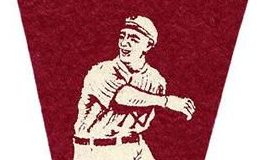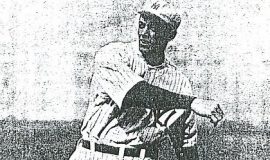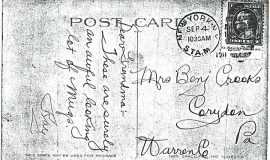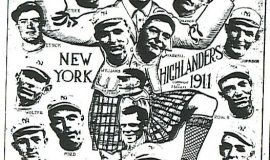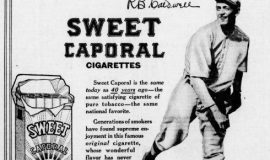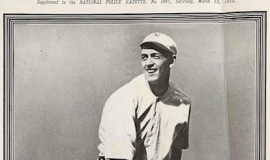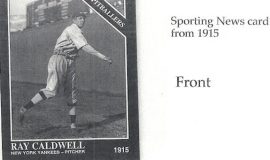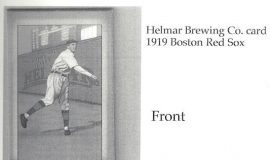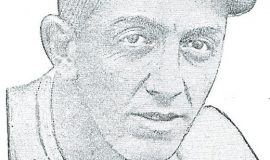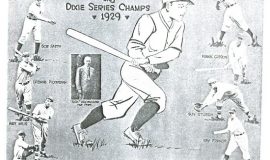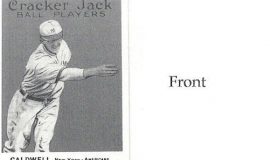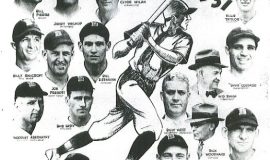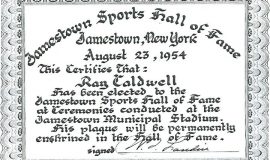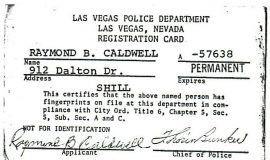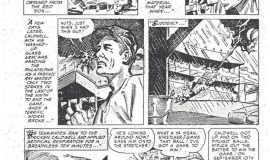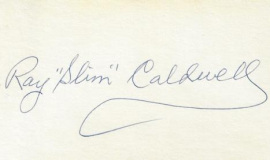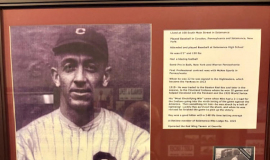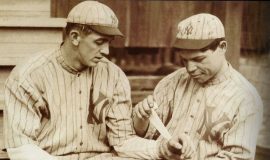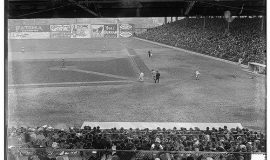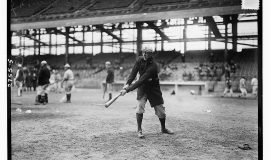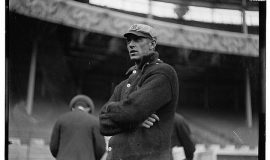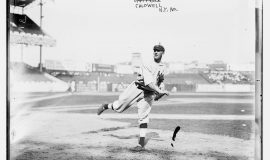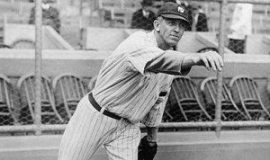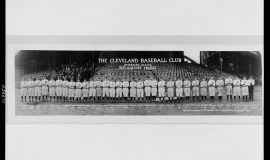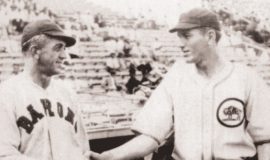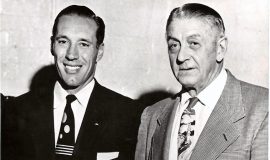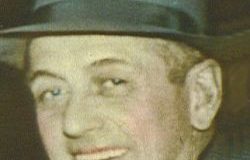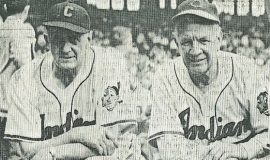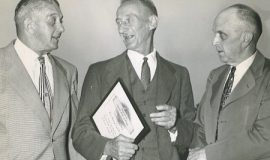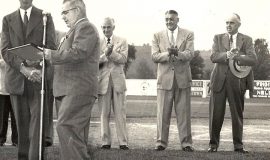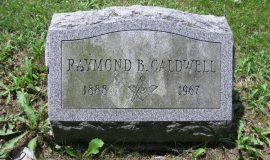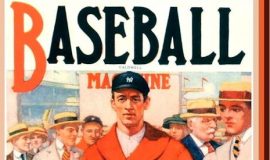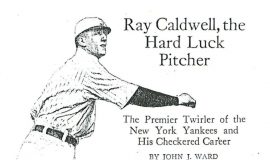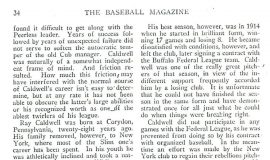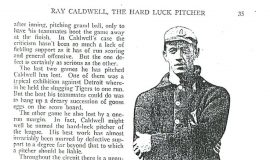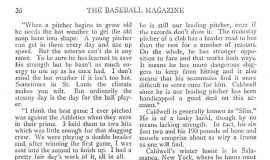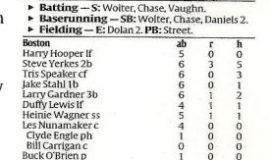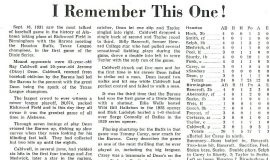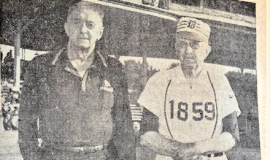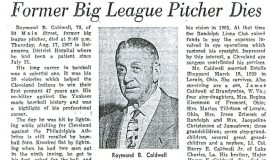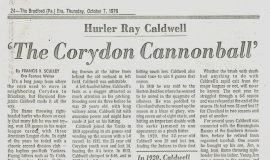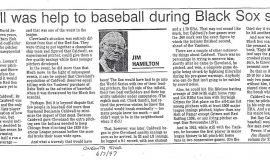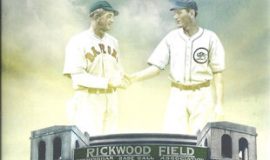Ray Caldwell

1888–1967
Category
Baseball
Year Inducted
2010
Caldwell was born in Corydon, Pa., on April 26, 1888. Corydon no longer exists because in 1965 it was put under the water of the Allegheny Reservoir when the Kinzua Dam was built. He grew up and completed high school at Salamanca.
Caldwell had a 133-120 record with 184 complete games and an ERA of 3.22 while pitching for the New York Highlanders, also called the Americans and later the Yankees, from 1910 through 1918, the Boston Red Sox for part of 1919 and the Cleveland Indians from 1919 through 1921. He had 1,006 strikeouts and 21 shutouts.
He won 20 games in 1920 for the Indians. He pitched more than 300 innings in 1915 with the Yankees and worked more than 200 innings in 1911, 1914, 1917 and 1920.
read more...
At Cleveland's League Park in 1919, Caldwell was struck by lightning in the bottom of ninth with two outs when pitching against Philadelphia and was unconscious. After regaining consciousness, Caldwell continued to pitch and got the final out.
When the spitball was outlawed in 1920, Caldwell was of 17 pitchers allowed to continue throwing the pitch.
In an interesting bit of trivia, Ray Caldwell was the starting pitcher for the New York Highlanders in the opening day game at the brand new Fenway Park, April 20, 1912.
He was so successful early in his career with the New York Americans, Washington offered Walter Johnson for him in a trade.
But Caldwell also known as mainly a pitcher of immense talent that was not always used. According to a biography of the right-hander by Steve Steinberg, "Ray's flashes of brilliance were usually followed by 'outbreaks of misbehavior,' followed by repentance, recovery, and pitching excellence, before the cycle began anew."
Grantland Rice wrote in 1914, "Caldwell could be as great as Matty (Christy Mathewson) or Walter Johnson, but instead of choosing their careers, he is evidently going to be another Rube Waddell."
And Fred Lieb, who covered baseball for 70 years, wrote in 1918, "Caldwell might have the Mathewson of the Yankees, but he turned out to be the Bugs Raymond of the local Americans. His irregular habits destroyed his effectiveness."
Caldwell was also quite a hitter and was often used as a pinch hitter. He hit .248 in 1,164 at bats and drove in 114 runs.
Caldwell showed his prowess with the bat in 1913 when he became the only pitcher in history to hit home runs on three successive days. The first two were as a pinch hitter.
Caldwell played 12 years in the minor leagues for Kansas City, Little Rock, Milwaukee, Memphis, Akron, Birmingham, Charlotte and Keokuk. He won 159 games and won 20 games twice.
He also managed in the minor leagues for the Keokuk Indians in 1933 and the Fremont Red Sox in 1940.
Caldwell bought a farm in Frewsburg in 1940 and worked at the train station at Ashville as a telegrapher for the Buffalo, Rochester and Pittsburgh Railway.
He later worked as a steward and bartender at the Lakewood Rod & Gun Club, where his fourth wife, Estelle, was a cook.
Ray Caldwell died in Salamanca on August 17, 1967, and is buried in Randolph.
more about Ray Caldwell
Memorabilia
select an image to enlarge
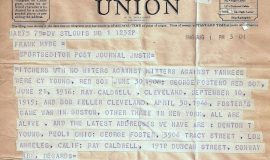 John George Taylor Spink (November 6, 1888 – December 7, 1962), or Taylor Spink, was the publisher of The Sporting News from 1914 until his death in 1962. He inherited the weekly American baseball newspaper from his father Charles Spink, younger brother of its founder Alfred H. Spink. Upon Taylor Spink's death in 1962, the Baseball Writers' Association of America established the annual J. G. Taylor Spink Award, given to writers "for meritorious contributions to baseball writing", and made him its first recipient. Telegram dated August 1, 1946.
John George Taylor Spink (November 6, 1888 – December 7, 1962), or Taylor Spink, was the publisher of The Sporting News from 1914 until his death in 1962. He inherited the weekly American baseball newspaper from his father Charles Spink, younger brother of its founder Alfred H. Spink. Upon Taylor Spink's death in 1962, the Baseball Writers' Association of America established the annual J. G. Taylor Spink Award, given to writers "for meritorious contributions to baseball writing", and made him its first recipient. Telegram dated August 1, 1946.
Photographs
select an image to enlarge
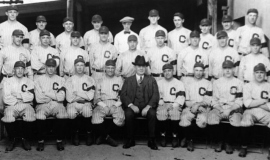 1920 Cleveland Indians. They are wearing black armbands honoring the memory of Ray Chapman. Ray Caldwell, first row, second from left. Photo courtesy of SABR Pictorial on Twitter (@SABRPictorial)
L-R: Top: Nunamkaer, Jamieson, Odenwald, Cycowski [?], Smallwood, Hamilton, Wood, Graney, Smith, Morton, Middle row: O'Neill, Thomas, Evans, Burns, Gardner, Lunte, Johnston, Wambsganss, Sewell, Bottom row: Uhle, Caldwell, Bagby, Speaker, Dunn, McAllister, Coveleski, Clark, Mails.
1920 Cleveland Indians. They are wearing black armbands honoring the memory of Ray Chapman. Ray Caldwell, first row, second from left. Photo courtesy of SABR Pictorial on Twitter (@SABRPictorial)
L-R: Top: Nunamkaer, Jamieson, Odenwald, Cycowski [?], Smallwood, Hamilton, Wood, Graney, Smith, Morton, Middle row: O'Neill, Thomas, Evans, Burns, Gardner, Lunte, Johnston, Wambsganss, Sewell, Bottom row: Uhle, Caldwell, Bagby, Speaker, Dunn, McAllister, Coveleski, Clark, Mails.
Publications
transcribed publications
- Hyde, Frank. "Onoville Man Who Hurled No-Hitter Against New York Yanks in 1919 Says 'Wasn't Much'." Post-Journal (Jamestown), June 22, 1945.
- Hyde, Frank. "Hooper Homered Off Caldwell's First Pitch." Post-Journal (Jamestown), July 3, 1945.
- Hyde, Frank. "Highlanders Gave Caldwell One Lone Run in 45 Innings." Post-Journal (Jamestown), July 11, 1945.
- Hyde, Frank. "Caldwell Hit Homers on Three Consecutive Days for Yankees." Post-Journal (Jamestown), July 18, 1945.
- Hyde, Frank. "Caldwell Hit Hard on Mound in 1919 Game - By Lightning." Post-Journal (Jamestown), July 25, 1945.
- Hyde, Frank. "Caldwell Recalls Chapman's Death." Post-Journal (Jamestown), August 9, 1945.
- Hyde, Frank. "Ray Caldwell Bid Farewell to Major Leagues After Cleveland-Brooklyn World Series of '20." Post-Journal (Jamestown), August 14, 1945.
- Forsyth, Waite. "Caldwell Named by Old Timers." Post-Journal (Jamestown), July 2, 1946.
- Hyde, Frank. "Caldwell, 20-Game Winner of 1920 Indians, Recalls Turbulent Days of Great Campaign; Picks '48 Tribe." Post-Journal (Jamestown), October 6, 1948.
- Hyde, Frank. "Caldwell Living Disproof of Adage Lightning Never Strikes Twice; It Got Him Three Times." Post-Journal (Jamestown), February 21, 1950.
- Hyde, Frank. "Caldwell Up Hard Way." Post-Journal (Jamestown), June 13, 1953.
- Hyde, Frank. "35 Years Ago Today Ray Caldwell Survived Lightning To Beat A's." Post-Journal (Jamestown), August 12, 1954.
- Lebovitz, Hal. "Caldwell, Now 73, Finds Life Much Brighter As He Leaves Hospital With Sight Restored." Cleveland Plain Dealer, May 27, 1961.
- Hyde, Frank. "Caldwell Heads For Cleveland And Another Eye Operation; Talks of Cobb And Old Days." Post-Journal (Jamestown), September 27, 1961.
- Hyde, Frank. "Baseball's Old Guard Here Who Threw It, Endorse Cronin's Return The Spitter Crusade." Post-Journal (Jamestown), November 14, 1961.
- Hyde, Frank. "Randolph Man Was Top Winning Pitcher On Yankees' Cellar Club 53 Years Ago." Post-Journal (Jamestown), September 10, 1966.
- Hyde, Frank. "Frankly Speaking." Post-Journal (Jamestown), August 19, 1967.
- Serkownek, Edith. "Ray Caldwell - Pitcher with 'the arm, the head and the heart'." unknown source and date.
scanned publications
select an image to enlarge
Videos
Websites
- "1919 Red Sox." Fenway Park Diaries. Accessed March 3, 2019. http://fenwayparkdiaries.com/1919%20red%20sox/sox%2006-24-1919.htm.
- Osborne, Chad. "August 24, 1919: Ray Caldwell struck by lightning, sparks Indians to win." Society for American Baseball Research. Accessed March 3, 2019. https://sabr.org/gamesproj/game/august-24-1919-ray-caldwell-struck-lightning-sparks-indians-win.
- Hockensmith, Ryan. "The incredible story of Ray Caldwell, the MLB pitcher who survived a lightning strike to finish a game." ESPN. Accessed September 16, 2021. https://www.espn.com/mlb/story/_/id/32061845/the-incredible-story-mlb-pitcher-survived-lightning-strike-finish-game.
- Puleo, Mark. "A lightning strike fueled baseball's most electrifying performance." Accuweather. Accessed July 1, 2021. https://www.accuweather.com/en/weather-news/pitcher-ray-caldwell-struck-by-lightning-went-on-to-win-baseball-game/967197.
- "Ray Caldwell." Baseball Reference. Accessed March 3, 2019. https://www.baseball-reference.com/players/c/caldwra02.shtml.
- Steinberg, Steve. "Ray Caldwell." Society for American Baseball Research. Accessed March 3, 2019. https://sabr.org/bioproj/person/8311d756.
- "Ray Caldwell." Wikipedia. Accessed March 3, 2019. https://en.wikipedia.org/wiki/Ray_Caldwell.
- "Ray Caldwell Stats." Baseball Almanac. Accessed March 3, 2019. http://www.baseball-almanac.com/players/player.php?p=caldwra02.
- "Ray 'Slim' Caldwell." Find A Grave. Accessed November 16, 2022. https://www.findagrave.com/memorial/20691/ray-caldwell.
- Brady, Erik. "Remembering Salamanca's own 'Remarkable Ray Caldwell,' who brought the heat and survived the lightning ." Buffalo News. Accessed April 25, 2022. https://buffalonews.com/news/local/erik-brady-remembering-salamancas-own-remarkable-ray-caldwell-who-brought-the-heat-and-survived-the/article_777aa39e-c0a4-11ec-
The additional financial assistance of the community is critical to the success of the Chautauqua Sports Hall of Fame.
We gratefully acknowledge these individuals and organizations for their generous support.

